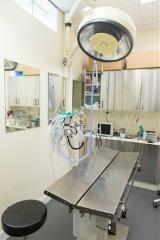The Pros and Cons of Leasing Equipment for Your Practice

Like most businesses, acquiring equipment for a veterinary practice is expensive. While these costs are unavoidable, trying to save money may lead to a choice of leasing versus buying. Although leasing may not be the best option for everyone, in some situations it could be the perfect solution for the future of a practice.
Points to Consider
Veterinary practices need medical equipment that is technologically advanced and efficient to accurately and quickly diagnose and determine medical treatments for patients. Whether the financial decision is made to invest in new technology or to replace outdated equipment, the reasons point to practice benefit. Unfortunately, purchasing this equipment often requires a substantial capital investment, a decision that is often financially challenging to make.
Tips When Considering Leasing Equipment
The U.S Small Business Administration provided the following basic information to help with a decision of whether to lease or purchase future equipment needed for the practice.
PRO:
- Leasing equipment offers an opportunity for the practice to have the equipment they need without having to make an investment and pay the full cost up front.
- Leasing often provides a business with the opportunity to have a higher level of equipment than it could afford in an outright purchase.
- Smaller monthly lease payments can make the need for new equipment financially feasible.
CON:
- It is important to be careful to calculate all of the expenses that come with leasing, as the lease may end up costing substantially more money than it would have if initially purchased outright.
Tax Benefits to Leasing Equipment
PRO:
- Leased equipment is often deductible from taxable income.
- The cost of assets of long-term (5, and sometimes 7 year) leases may be eligible to be claimed as capital allowances.
CON:
- The cost of assets of leases fewer than 5 (and sometimes 7) years cannot be claimed as capital allowances
- It is necessary to keep abreast of any/all changes to the tax ramifications of leasing equipment as deductions and eligibilities may change.
Maintenance of Leased Equipment
PRO:
- Leasing companies often take the responsibility for the maintenance of their leased equipment.
- Sometimes leasing companies receive discounted rates on maintenance fees, replacement parts, and labor costs, which can save the practice money.
CON:
- Some lease agreements can be rigid and unbreakable, even if the business can no longer use the leased equipment.
Upgrade Abilities
PRO:
- If a practice decides that an upgrade is needed on a piece of equipment, leasing can make the upgrade process easy:
- Older equipment does not need to be sold by the practice
- Newer equipment does not need to be located
CON:
- Leasing contracts establish the guidelines; because the equipment is not owned by the practice, it may be difficult to interrupt a lease for a newer piece of equipment.
Recommendations
The SBA recommends that the IRS Guidelines be reviewed carefully in order to obtain guidelines that identify tax advantages and disadvantages of leasing equipment. This information can be found here.
The advancement of technology changes the way that veterinarians do business. As it continues to merge with science and veterinary medicine, practices need to be aware of alternative financial strategies that will enable these products to be placed within a practice for improving animal health care.
Looking for other strategies to better your practice? Contact your Covetrus representative today at 855.724.3461.


Working Here
Our team members are encouraged to be the best they can be... at Covetrus we believe we impact one another.
Learn MoreNews & Events
FDA Cautions Pet Owners Not to Feed Texas Tripe Inc. Raw Pet Food Due to Salmonella, Listeria Monocytogenes
The U.S. Food and Drug Administration is cautioning pet owners not to feed their pets any of the Texas Tripe brand raw frozen pet food listed below because several samples of Texas Tripe raw pet food have tested positive for Salmonella and/or L. mono.
Careers
Are you looking for a place to let your talents shine? At Covetrus, we help our practitioner customers better serve their patients and take pride in providing the best customer experience possible. Search our open positions to see our available opportunities.
Newsletter
Stay current with what’s going on with Covetrus, subscribe to receive our newsletter and email communications. Subscribers will receive the latest information in practice management, sales and marketing, animal health, and more.



-3-(1).png?sfvrsn=2d806d73_0)

Leave a comment